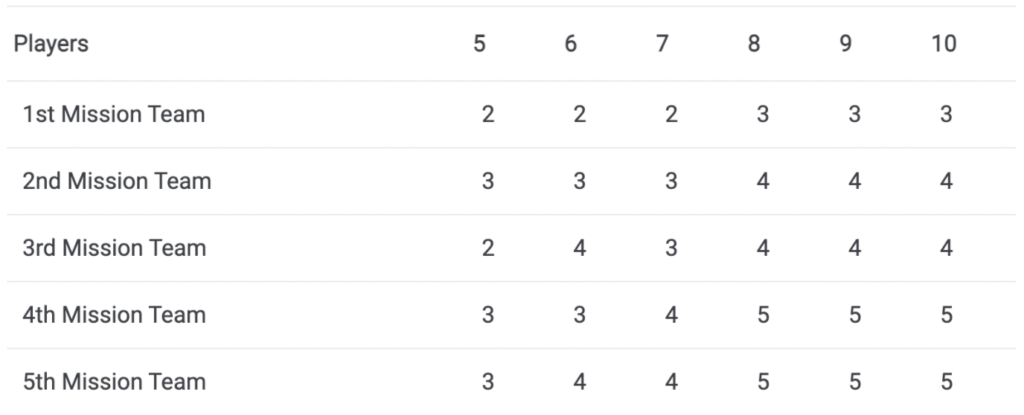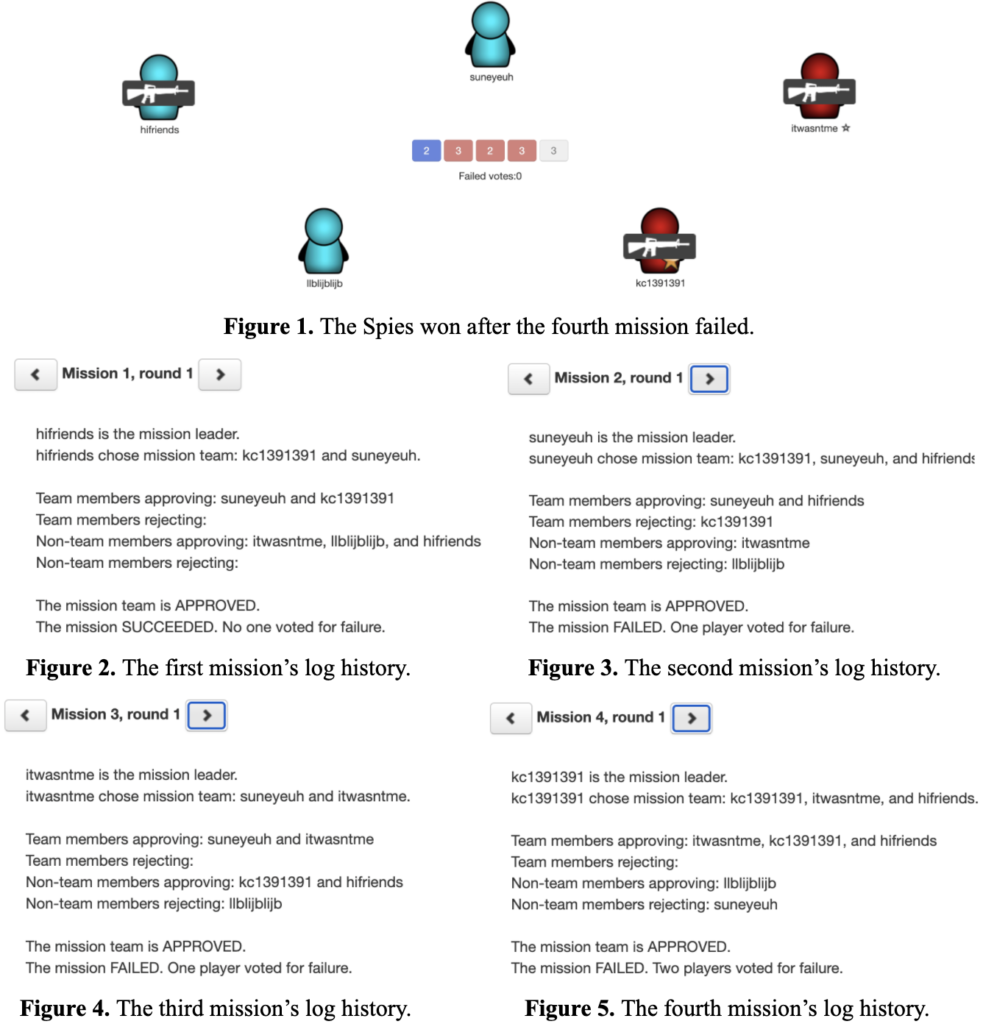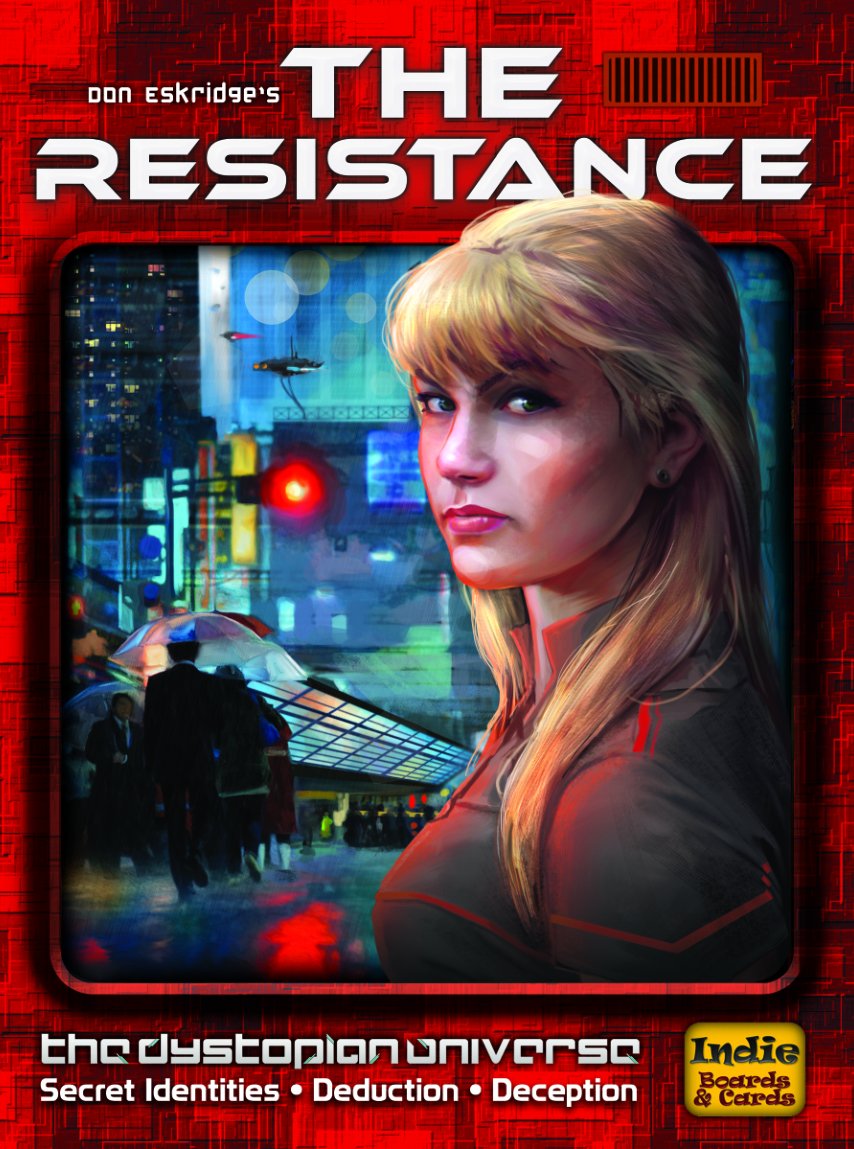Name of game, creator, platform
- The Resistance
- Created by Don Eskridge
- Tabletop or online (I played it online)
Target audience
- People at a gathering who enjoy deductive reasoning
Notable elements of the game
- Number of players: 5-10
- Actions a player can take: The leader can choose some players to send on a mission. All players can approve/reject a mission. A player sent on a mission votes whether the mission succeeds or fails (Resistance can only vote for success, Spies can vote for success or failure).
- Rounds: There are 5 rounds. Each round has a different leader who sends a certain number of players on a mission, according to the table below.

- Formal elements:
| Players | Team competition (Resistance v.s. Spies) |
| Objective | Outwit |
| Outcome | Zero-sum game (one team wins, the other loses) |
| Procedures | In the Spy Recognition Phase, all players close their eyes, Spies open their eyes to recognize each other then close their eyes, then all players open their eyes.
Then play 5 rounds. During each round, the player to the left of the previous leader becomes the new leader.
|
| Rules |
|
| Resources |
|
| Boundaries | The table (if playing the tabletop version), or the virtual room (if playing the online version). |
Comparison to other games in the genre
- The Resistance is very similar to Avalon. In fact, it is just a more simple version of Avalon, with a different premise (Resistance and Spies v.s. Good and Evil). Furthermore, unlike in Avalon, the roles in The Resistance do not have special powers (e.g., assassination).
- Or more generally, The Resistance is similar to many social deduction games, such as Werewolves and Mafia, where the good players try to figure out who the evil players are, and the evil players try to prevent the good players from doing so.
- I think The Resistance is both better and worse than Avalon due to its relative simplicity, a double-edged sword. It is better because of the simple rules (no complicated special powers), but worse because the premise and roles are less interesting.
- I think The Resistance is better than both Mafia and Werewolves because the goal of the good players is not just to figure out who the evil players are. Instead, victory results from figuring out who they are and preventing them from failing missions, which adds a layer of depth to the gameplay.
What happened
- For this assignment, I played The Resistance with four friends in the same physical room but using the online platform. There were 2 Spies (I was one of them) and 3 Resistants. The first mission succeeded, and the second, third, and fourth failed, so the Spies won in the end. I was kc1391391 and the leader of the fourth (final) mission. See figures below for our gameplay.

Was the game fun?
- I thought the game was fun, mostly because I won. I also cooperated with the other spy, itwasntme, very well. See more in the moments of success/failure section below.
- Although the premise of the game is simple, I found it particularly intriguing that the first one or two missions usually passed innocently, as a general good strategy is to prove yourself (or pretend to be) innocent at the beginning. But in later missions, tensions and debate arose, and shouting was frequent. It was also interesting to be the leader under the gun who carries the responsibility to pick the right people for a crucial mission.
Moments of success/failure
- For my team (the Spies), there were only moments of success. In the first mission, I was chosen by the leader (hifriends, a Resistant) to go on a mission, and I successfully pretended to be innocent by letting the mission succeed, which prompted the next leader (suneyeuh, another Resistant) to choose me again. I failed the mission this time, but acted as if I was innocent and blamed it on the two other players on that mission (suneyeuh and hifriends). Most players were convinced that I was innocent when I was actually not. In the third mission, the other Spy (itwasntme) was the leader. He successfully failed the mission and pretended to be innocent by choosing himself and one Resistant (suneyeuh). Due to the second mission, people thought suneyeuh, rather than itwasntme, was a Spy. In the fourth mission, I was the leader. It was basically a guaranteed win for the Spies because I just needed both me and itwasntme on the mission for it to fail, and at this point, people believed that both of us were good. So the mission was approved, and we won the game.
- From the other team’s (the Resistance’s) perspective, there were moments of failure. They failed to notice that itwasntme and I were lying the whole time pretending to be innocent. They also failed to send llblijblijb on a mission to learn information about him. But they were also just unlucky, because the crucial (third and fourth) missions happened to be led by the Spies.
Things I would change
- To make the game better, I would add a time limit to the Squad Phase during which the leader chooses people to send on a mission. I believe this time limit would increase the pressure, which means more adrenaline, more intense debate, and more fun.
- Another modification to consider is to add more rounds to the game. Instead of winning 3 out of 5 rounds, maybe I would change it to winning 4 out of 7 rounds to make it even more mind challenging for social deduction.
- Otherwise, I think The Resistant is a very well-designed game on its own. The only thing I disliked about it was that the roles were too simple and there were no differences between players on the same team, but I could just switch to playing Avalon for more interesting roles.



